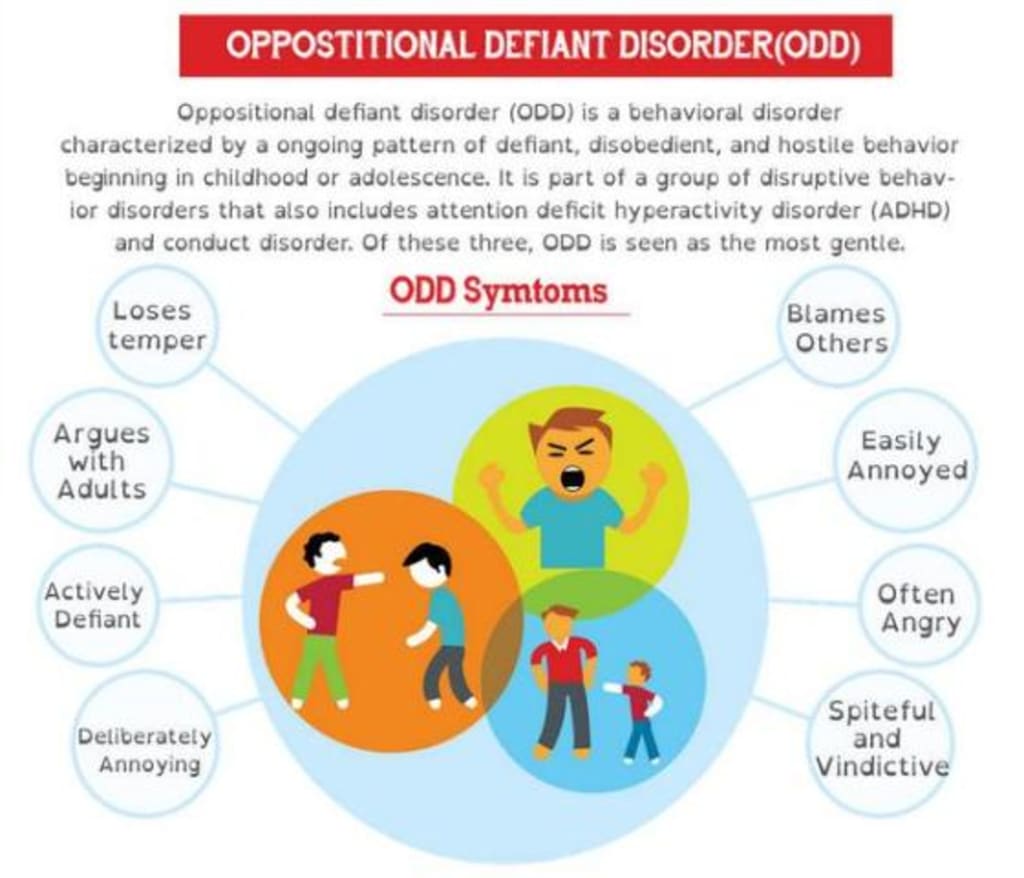Oppositional Defiant Disorder (ODD)
After finding out one of my child has it, I've wondered how others cope and did research on it. Hoping to help others to be aware and how to help their children.

What is Oppositional Disorder?
Any child could be considered normal right? No one wants to know that there is something wrong with their child? Well neither did I until I actually investigated the diagnosis. Oppositional Defiant Disorder took me by surprise when I realized that the meaning described my child perfectly. Definition of this disorder says that some kids act angry, defiant and aggressive in sprite of the consequences they will receive and if the behavior continues for six months or more it can be a sign of disruptive behavior disorder. After carefully researching I noticed that it also shares common affects with ADHD such as trouble keeping emotions in check and doing risky and impulsive things. Oppositional Defiant Disorder usually cause problems at school and home. Symptoms generally begin before a child is 8-years-old and most kids have angry outbursts and sometimes us aggression to solve problems. Even though it is a part of growing up and learning to be independent; it is crucial to remember that extreme outburst aren’t normal. Unlike a two-year-old testing limits for the word, “no”, most children with ODD will test further and not expect the consequences to be severe. Common phrases used are, “out of control” or “wild”, which shows the similarity to ADHD but keep in mind that ODD and ADHD are not the same thing but do coexist. The cause is unknown but likely involves a combination of genetic and environmental factors and there are more than 200,000 U.S. cases per year. Even though there is no cause for the disorder, it is broken into two main types: Conduct Disorder (CD) and Oppositional Defiant Disorder, each different from each other but children with Conduct Disorder may develop Oppositional Defiant Disorder.
What are the symptoms?
Just like any disease or disorder there are noticeable symptoms. Starts with irritable mood, argumentative, defiant behavior, screaming aggression, vindictiveness, antisocial behavior, impulsive, self-harm, anger or anxiety/depression or problem paying attention, low self-esteem, frequently losing their temper, being easily annoyed, refusing to follow rules, deliberately annoying people and blaming others for mistakes. Sometimes it’s difficult to recognize the difference between a strong-willed or emotional child and one with ODD and sometimes symptoms can develop later but almost always before early teenage years. Each of the symptoms vary in severity. Mild occurring in one setting such as home or school or work or even with peers. Moderate occurring in two settings at the same time and severe occurring in three or more settings.
What to look for…
Minus the symptoms to be careful of, there are things to look for when being diagnosed with Oppositional Defiant disorder or any defiant disorder. Things to look out for are your responses. As parents sometimes, we aren’t always observant, but we should be careful of the repeated behavior problems we do see. Sometimes we are often pushed to an extreme and become either permissive or coercive with out child. Children with this disorder won’t change their behavior if approached in these ways and it may lead to more negative interactions and hostile patterns of behavior which become routine. Taking caution with these types of behavior will save you in the long run and show your child that it is unacceptable behavior.
Diagnosis…
Typically diagnosed around elementary school ages. Physician will take a detailed history of child’s behavior in various situations. They will ask if the behavior has lasted at least six months and does it involve one individual who is not a sibling. When being diagnosed they must have a pattern of disruptive behavior including at least four symptoms from these categories: angry/irritable mood, argumentative/defiant behavior and vindictiveness.
Treatment…
Like most behavioral disorders there is no cure but with ODD it is treatable. Some options suggested are behavioral therapy or a combination of behavioral therapy and medication, individual/family therapy, cognitive behavioral therapy, applied behavior analysis, group psychotherapy, psychotherapeutic, stimulation medication and pharmacological. Therapy is essential with this type of behavioral disorder but also parenting plays a huge role. Parents may be encouraged to receive training which might include therapy sessions with parent and child working together or just the parent. Another type of therapy is psychotherapeutic. Psychotherapeutic is about repairing the parent-child relationship. Services offered are learning to train the child’s behavior through setting clear expectations and consistently praising when direction or tasked is followed through. Most importantly using effective consequences when tasks or directions aren’t followed to show where each of you stand in the relationship. Usually with ODD medication isn’t prescribed but is an option when a child suffers from ADHD and ODD or is struggling with excessive impulsivity. Not recommended by the FDA but there is a pharmacological medication. It consists of Antipsychotics such as Abilify and Risperdal which are only prescribed if a child is at risk of being removed from school or home. Overall the treatment options come down to receiving therapy and learning behavioral skills. Which some children might even benefit from social skills training to improve their peer relationships or cognitive behavioral therapy if they are struggling with anxiety or depression. Coping skills and therapy are the most effective treatment for a child struggling with ODD and overtime results will begin to show and help the child and parent to understand each other better.
Risk factors/Complications…
Oppositional defiant disorder isn’t developed overnight. Observations of repeated patterns of negative interactions with parents or other authority figures usually lead down that path. Experiencing stress or trauma in a person’s life can also lead to ODD. Children who had a lot of difficulty soothing themselves as toddlers and continue to struggle to manage their emotions like frustration and disappointment are as risk of developing behavior disorders. Having other mental disorders that aren’t diagnosed may make it difficult to diagnose a behavior disorder and difficult to treat ODD when other disorders aren’t evaluated and treated appropriately. ODD if not diagnosed probably will lead to problems in school or work performance, antisocial behavior, impulse control, substance abuse and suicide. In the end those who struggle with behavior disorders will struggle to make and keep friends or relationships.
Is there a connection between ODD and ADHD?
How are disruptive behavior disorders and ADHD different?
No one is sure of what the connection between ODD and ADHD is. Some think it may be tied into the fact that some children with ADHD have a hard time controlling impulsive behavior and emotions make it hard for kids to take turns and think before acting. There are cases where a child will have both disorders and symptoms will be similar making it difficult to diagnose. However, not all children with ADHD develop a behavioral problem. An example of the difference between the disorders is with ADHD children may react to their environment and get upset but a child with ODD will have disruptive behavior and will be looking for arguments and ways to break rules or rebel. It is a good idea to know the difference but also to know these disorders share similar symptoms and just be aware of what to look for.
Conduct Disorder…
Known as CD (conduct disorder) is one of the two types of behavior disorders besides ODD (oppositional defiant disorder). There is no known cause but is believed to be cause by a combination of genetic, psychological and environmental factors. Just like ODD, CD is not typically diagnosed until the teenage years. Signs to look out for are lying without feeling bad about it, threatening behavior such as fighting/bullying/emotional abuse, stealing or destroying things and refusing to follow rules/laws. A major sign to watch out for is no respect or regard to other people’s rights or feelings. This type of disorder seems to be related to a child’s temperament such as their general mood. Those with this disorder enjoy causing harm and hurting other people. Overall children with CD tend to be more difficult and negative instead of easy-going and positive. Conduct disorder and Oppositional defiant disorder share similar traits but are found in different age groups. Keeping an eye on a child behavior can help develop better habits and ways to deal in difficult situations and be diagnosed with the correct diagnosis.
Oppositional defiant disorder is known as a behavioral problem. There are two different types and symptoms that categorize it. Linked along with ADHD, this disorder can be treated with the appropriate care. However, at the end of the day it all depends on the child and whether they are willing to make a change. Help from the parent(s) goes along way as well and progress overtime will appear. As a mother who has a child that struggles with ODD and ADHD, I relate to a lot of these symptoms and behavior. Everyday is a struggle and something new in the pattern appears. Things can’t be change or meltdowns appear or a struggle over little things. Issues like these disorders should be discussed to help other parent(s) deal and learn how to cope in situations they feel they can’t handle. Overall it is to help others out there know they aren’t alone, and support is only a website or chat site away.
About the Creator
MICHELLE SMITH
An inspirational poet. Writing poems to show others that it is okay to show feelings another way. I've tried a couple articles but I've found I'm better at the poetry. Just want to inspire and encourage others through tough times.






Comments
There are no comments for this story
Be the first to respond and start the conversation.